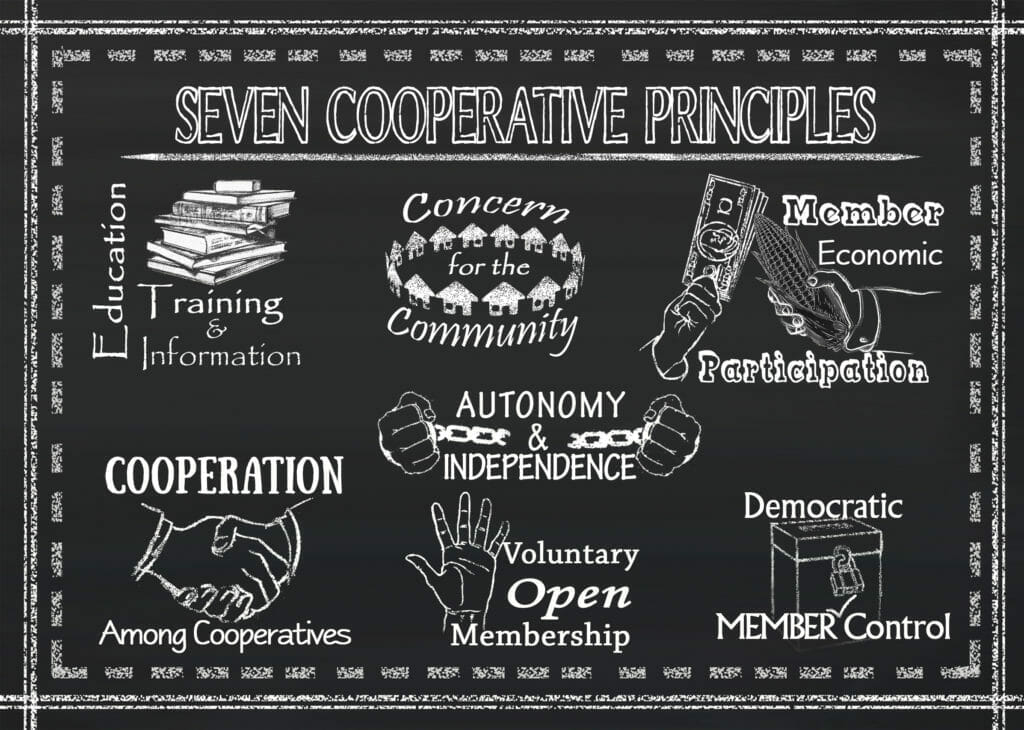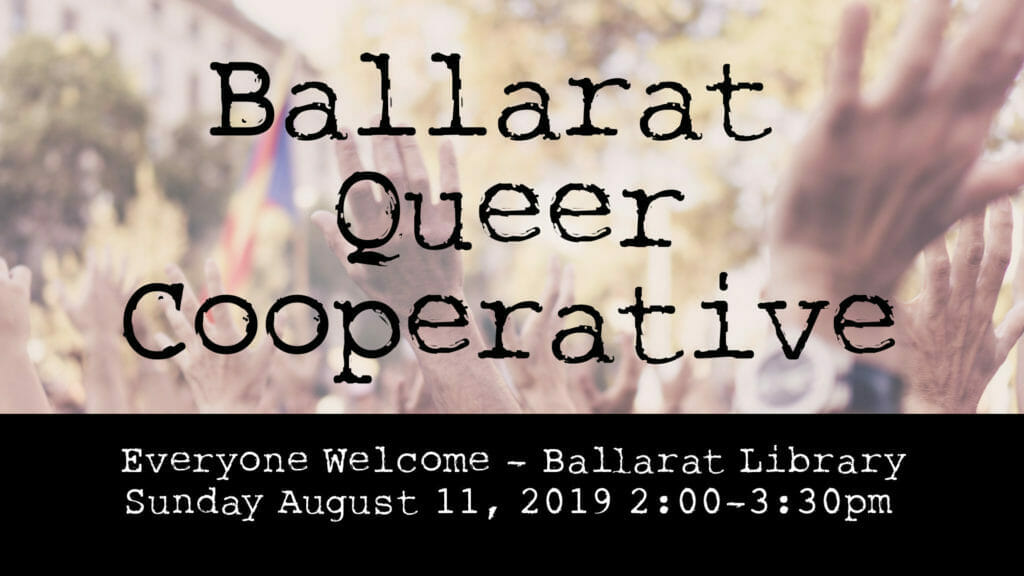Originally published August 6, 2019
Last updated December 12, 2019
Posted in Ballarat, Gender & Sexuality, Uncategorized
We are a group of queer/LGBT+/etc people from the Ballarat region who are coming together to build a stronger community. On Sunday 11th August we’ll be gathering over a cuppa to talk about how we can support each other, advocate for ourselves, and address problems such as violence, discrimination and isolation.
Previous groups have come and gone, but we hope by forming a cooperative, where every member is equally welcomed, listened to, and engaged, that we can make a real change. We look forward to standing with you in radical acts of visibility and cooperation.
If you identify as queer/LGBT+/any other marginalised sexuality or gender, no matter what your background is, please come join us for our first get-together to find out more!
It’s a group effort, with various people stepping up to help organise and run the first meeting, and we’re making a concerted effort for inclusivity, to reach as many queer people (defined broadly) in the Ballarat region as we can – especially those who might not have been included in the past – and make sure everyone is welcomed and heard.
I’m in a strange position as the person who first floated the idea of the cooperative, because on the one hand my sense of What This Thing Should Be is going to have some weight, but on the other hand, that needs to be balanced with what the community at large wants.
In the wake of Ballarat Pride Hub shutting down, I think there’s room for a multiplicity of local queer groups to flourish. Those could range from purely social to highly political, from those that work with agencies to those that focus on individuals, from formal to informal, from close-knit to expansive. I know there are other ideas being floated, some of which don’t agree with the BQC approach, and that’s fantastic! Diversity is strength, including our diversity of ideas and approaches.
That said, I wanted to just make a post, as me – Alex Bayley, one person – about the ideas that started this BQC thing, and what I’m bringing to the table on Sunday when we have our first gathering. This will be the first of a handful of posts, as I’d also like to talk about the term “queer” and the process I’m hoping to use at the meeting on Sunday.
What is a cooperative?
First of all, let’s talk about the word “cooperative,” because there are certain implications in using that word for the group. For a long time I thought cooperative just meant “a group of people who work together,” but in fact, it’s more than that.
Cooperativism is an international movement that began in the 18th and 19th centuries in the United Kingdom. It grew out of mutual aid societies, also known as friendly societies (many of which later turned into financial institutions, like IOOF in Australia), and working class movements during the industrial revolution, like the group of weavers in Rochdale, Lancashire who founded the first consumer cooperative, running a store to sell affordable goods to their members. Today, co-operatives include:
- Worker cooperatives, who own and run businesses together.
- Consumer cooperatives, who save money by buying goods together.
- Financial cooperatives, who operate credit unions and other financial institutions.
- Housing cooperatives, who own housing together.
- Community cooperatives, who work together for a better community.
- Cooperatives of cooperatives, who work together on a larger scale for their members’ benefit.
Cooperative principles
The Rochdale group created the Rochdale Principles, which still guide cooperatives today. In their modern form, these principles are as follows:

- Voluntary and Open Membership: a cooperative is open to all persons able to use their services and willing to accept the responsibilities of membership. (Note: a cooperative can set requirements, such as that members must live in a certain area, or work in a certain industry.)
- Democratic Member Control:Cooperatives are democratic organisations controlled by their members, who actively participate in setting their policies and making decisions.
- Member Economic Participation: Members contribute equitably to, and democratically control, the capital of their cooperative. At least part of that capital is usually the common property of the cooperative.
- Autonomy and Independence: Cooperatives are autonomous, self-help organisations controlled by their members. If they enter into agreements with other organisations, including governments, or raise capital from external sources, they do so on terms that ensure democratic control by their members and maintain their cooperative autonomy.
- Education, Training, and Information: Cooperatives provide education and training for their members, elected representatives, managers, and employees so they can contribute effectively to the development of their cooperatives.
- Cooperation among Cooperatives: Cooperatives serve their members most effectively and strengthen the cooperative movement by working together through local, national, regional and international structures.
- Concern for Community: Cooperatives work for the sustainable development of their communities through policies approved by their members.
For more information, see the International Cooperative Alliance’s information on Cooperative Identity, Values and Principles.
From my point of view, the benefit of a cooperative is true ownership by the whole community, and the ability for everyone to be heard equally, rather than power to be centralised in a committee.
Incorporating as a cooperative
In Victoria, cooperatives can be registered through Consumer Affairs Victoria, just like an incorporated association. Incorporated associations are most often used for local community groups, such as netball clubs or cultural associations, but they aren’t the only choice.
The Model Rules for cooperatives are different, requiring open membership and so forth in accordance with the principles above. If you are interested, you can see the Model Rules for a Non-Distributing Co-operative Without Share Capital, which is the type that would be most likely for a community cooperative.
If the Ballarat Queer Cooperative decides to incorporate as a cooperative, this would be the appropriate way to do it, to ensure the cooperative principles are followed.
More to come…
I’ll be following this with a couple more posts, largely so there’s information somewhere visible to point people at if they want to know where I’m coming from.
Again, just a note that I’m a single person, and that the gathering on Sunday will be an opportunity for everyone’s voice to be heard. If you disagree with the idea of a cooperative, or have other ideas for what we should do, I encourage you to come along and voice that disagreement and/or do a separate thing of your own. There’s room for all kinds of approaches!
References
“Ballarat Queer Cooperative – First Ever Gathering.” Facebook. Accessed August 6, 2019. https://www.facebook.com/events/418879565390684/.
Consumer Affairs Victoria, Victorian Government. “Register a Co-Operative.” Accessed August 6, 2019. https://www.consumer.vic.gov.au:443/licensing-and-registration/co-operatives/register-a-co-operative.
———. “Register as an Incorporated Association.” Accessed August 6, 2019. https://www.consumer.vic.gov.au:443/clubs-and-fundraising/incorporated-associations/become-an-incorporated-association/register-as-an-incorporated-association.
International Co-operative Alliance. “Cooperative Identity, Values & Principles.” International Co-operative Alliance. Accessed August 6, 2019. https://www.ica.coop/en/cooperatives/cooperative-identity.
———. “International Co-Operative Alliance.” Accessed August 6, 2019. https://www.ica.coop/en.
“Model Rules for a Non-Distributing Co-Operative without Share Capital.” Consumer Affairs Victoria. Accessed August 6, 2019. https://www.consumer.vic.gov.au/library/forms/businesses/cooperatives/model-rules-for-a-non-distributing-cooperative-with-share-capital.doc.
Wikipedia contributors. “History of the Cooperative Movement.” In Wikipedia, July 19, 2019. https://en.wikipedia.org/w/index.php?title=History_of_the_cooperative_movement&oldid=907029511.
———. “IOOF (Company).” In Wikipedia, June 27, 2019. https://en.wikipedia.org/w/index.php?title=IOOF_(company)&oldid=903662500.
———. “Rochdale Principles.” In Wikipedia, April 19, 2019. https://en.wikipedia.org/w/index.php?title=Rochdale_Principles&oldid=893161250.
———. “Rochdale Society of Equitable Pioneers.” In Wikipedia, July 22, 2019. https://en.wikipedia.org/w/index.php?title=Rochdale_Society_of_Equitable_Pioneers&oldid=907439334.
Support my work
Hi, I'm Alex. I'm an independent researcher, writer, educator and activist based in Ballarat, Australia. If you appreciate my work, please consider becoming a patron on Patreon. Even $1 a month helps!
Not only will you help me do more work like this, but you'll also get regular updates and sneak peeks at my work in progress.


Mentions